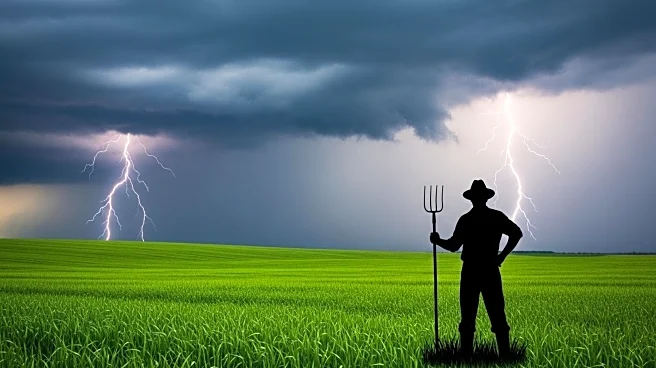What's Happening?
The Pakistan Kissan Ittehad (KIP) has criticized Pakistani authorities for filing FIRs against farmers in Nasirabad, who were peacefully demonstrating for their rights. KIP Chairman Khalid Hussain Bathh, along with Arya Hoorain and Raza Muhammad Khilji, demanded the withdrawal of these cases and the immediate release of detained farmers. Bathh warned that failure to address these issues could lead to large-scale protests across several districts. He urged the government to declare wheat support prices before the sowing season to encourage cultivation and stabilize the agricultural sector. Additionally, Bathh called for a joint committee to assess the transition of agricultural tube wells to solar power, ensuring farmers' electricity connections remain intact during the review process. The agricultural community in Balochistan faces challenges such as water scarcity and erratic energy supply, exacerbated by recent government actions.
Why It's Important?
The targeting of farmers by Pakistani authorities amid an agricultural collapse has significant implications for food security and economic stability in the region. The agricultural sector is crucial for Pakistan's economy, and the unrest among farmers could lead to disruptions in food production and supply chains. The government's handling of the situation may affect its credibility and relationship with the agricultural community, potentially leading to prolonged unrest. The demand for policy interventions highlights the need for effective governance to address the challenges faced by farmers, including water scarcity and energy supply issues. The situation underscores the importance of supporting the agricultural sector to ensure food security and economic stability.
What's Next?
If the government fails to address the farmers' grievances, large-scale protests could occur, further destabilizing the region. The formation of a joint committee to assess the solar power transition and the declaration of wheat support prices are potential next steps that could alleviate tensions. The government's response to these demands will be crucial in determining the future of the agricultural sector and its relationship with farmers. Stakeholders, including political leaders and civil society groups, may need to engage in dialogue to find solutions that protect the interests of farmers and ensure food security.
Beyond the Headlines
The crackdown on farmers raises ethical concerns about the government's approach to handling dissent and addressing the needs of vulnerable communities. The situation highlights the broader issue of governance and the need for policies that prioritize the welfare of citizens. The transition to solar power for agricultural tube wells represents a shift towards sustainable energy practices, which could have long-term benefits for the environment and energy security. However, the implementation of such projects must be carefully managed to avoid negative impacts on farmers.










